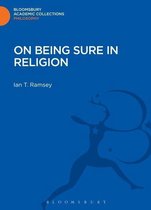Axtell, G: Problems of Religious Luck Assessing the Limits of Reasonable Religious Disagreement
Afbeeldingen
Sla de afbeeldingen over
Artikel vergelijken
Auteur:
Guy Axtell
- Engels
- Hardcover
- 9781498550178
- 06 december 2018
- 290 pagina's
Samenvatting
This book develops an inductive risk account of the limits of reasonable religious disagreement. The riskiness of different people’s methods for forming religious beliefs is shown central both to understanding fundamentalist orientation and to concerns that philosophers and theologians share for “ownership” of risk in people’s faith ventures.
To speak of being religious lucky certainly sounds odd. But then, so does “My faith holds value in God’s plan, while yours does not.” This book argues that these two concerns — with the concept of religious luck and with asymmetric or sharply differential ascriptions of religious value — are inextricably connected. It argues that religious luck attributions can profitably be studied from a number of directions, not just theological, but also social scientific and philosophical. There is a strong tendency among adherents of different faith traditions to invoke asymmetric explanations of the religious value or salvific status of the home religion vis-à-vis all others. Attributions of good/bad religious luck and exclusivist dismissal of the significance of religious disagreement are the central phenomena that the book studies. Part I lays out a taxonomy of kinds of religious luck, a taxonomy that draws upon but extends work on moral and epistemic luck. It asks: What is going on when persons, theologies, or purported revelations ascribe various kinds of religiously-relevant traits to insiders and outsiders of a faith tradition in sharply asymmetric fashion? “I am saved but you are lost”; “My religion is holy but yours is idolatrous”; “My faith tradition is true, and valued by God, but yours is false and valueless.” Part II further develops the theory introduced in Part I, pushing forward both the descriptive/explanatory and normative sides of what the author terms his inductive risk account. Firstly, the concept of inductive risk is shown to contribute to the needed field of comparative fundamentalism by suggesting new psychological markers of fundamentalist orientation. The second side of what is termed an inductive risk account is concerned with the epistemology of religious belief, but more especially with an account of the limits of reasonable religious disagreement. Problems of inductively risky modes of belief-formation problematize claims to religion-specific knowledge. But the inductive risk account does not aim to set religion apart, or to challenge the reasonableness of religious belief tout court. Rather the burden of the argument is to challenge the reasonableness of attitudes of religious exclusivism, and to demotivate the “polemical apologetics” that exclusivists practice and hope to normalize.
To speak of being religious lucky certainly sounds odd. But then, so does “My faith holds value in God’s plan, while yours does not.” This book argues that these two concerns — with the concept of religious luck and with asymmetric or sharply differential ascriptions of religious value — are inextricably connected. It argues that religious luck attributions can profitably be studied from a number of directions, not just theological, but also social scientific and philosophical. There is a strong tendency among adherents of different faith traditions to invoke asymmetric explanations of the religious value or salvific status of the home religion vis-à-vis all others. Attributions of good/bad religious luck and exclusivist dismissal of the significance of religious disagreement are the central phenomena that the book studies. Part I lays out a taxonomy of kinds of religious luck, a taxonomy that draws upon but extends work on moral and epistemic luck. It asks: What is going on when persons, theologies, or purported revelations ascribe various kinds of religiously-relevant traits to insiders and outsiders of a faith tradition in sharply asymmetric fashion? “I am saved but you are lost”; “My religion is holy but yours is idolatrous”; “My faith tradition is true, and valued by God, but yours is false and valueless.” Part II further develops the theory introduced in Part I, pushing forward both the descriptive/explanatory and normative sides of what the author terms his inductive risk account. Firstly, the concept of inductive risk is shown to contribute to the needed field of comparative fundamentalism by suggesting new psychological markers of fundamentalist orientation. The second side of what is termed an inductive risk account is concerned with the epistemology of religious belief, but more especially with an account of the limits of reasonable religious disagreement. Problems of inductively risky modes of belief-formation problematize claims to religion-specific knowledge. But the inductive risk account does not aim to set religion apart, or to challenge the reasonableness of religious belief tout court. Rather the burden of the argument is to challenge the reasonableness of attitudes of religious exclusivism, and to demotivate the “polemical apologetics” that exclusivists practice and hope to normalize.
Productspecificaties
Wij vonden geen specificaties voor jouw zoekopdracht '{SEARCH}'.
Inhoud
- Taal
- en
- Bindwijze
- Hardcover
- Oorspronkelijke releasedatum
- 06 december 2018
- Aantal pagina's
- 290
- Illustraties
- Nee
Betrokkenen
- Hoofdauteur
- Guy Axtell
- Hoofduitgeverij
- Lexington Books
Overige kenmerken
- Extra groot lettertype
- Nee
- Product breedte
- 173 mm
- Product hoogte
- 21 mm
- Product lengte
- 230 mm
- Studieboek
- Ja
- Verpakking breedte
- 173 mm
- Verpakking hoogte
- 21 mm
- Verpakking lengte
- 230 mm
- Verpakkingsgewicht
- 531 g
EAN
- EAN
- 9781498550178
Je vindt dit artikel in
- Categorieën
- Taal
- Engels
- Boek, ebook of luisterboek?
- Boek
- Beschikbaarheid
- Leverbaar
- Stroming of stijl
- Existentialisme & Fenomenologie
Kies gewenste uitvoering
Kies je bindwijze
(3)
Prijsinformatie en bestellen
De prijs van dit product is 114 euro en 99 cent.
3 - 4 weken
Verkoop door bol
- Prijs inclusief verzendkosten, verstuurd door bol
- Ophalen bij een bol afhaalpunt mogelijk
- 30 dagen bedenktijd en gratis retourneren
- Dag en nacht klantenservice
Shop dit artikel
Rapporteer dit artikel
Je wilt melding doen van illegale inhoud over dit artikel:
- Ik wil melding doen als klant
- Ik wil melding doen als autoriteit of trusted flagger
- Ik wil melding doen als partner
- Ik wil melding doen als merkhouder
Geen klant, autoriteit, trusted flagger, merkhouder of partner? Gebruik dan onderstaande link om melding te doen.









